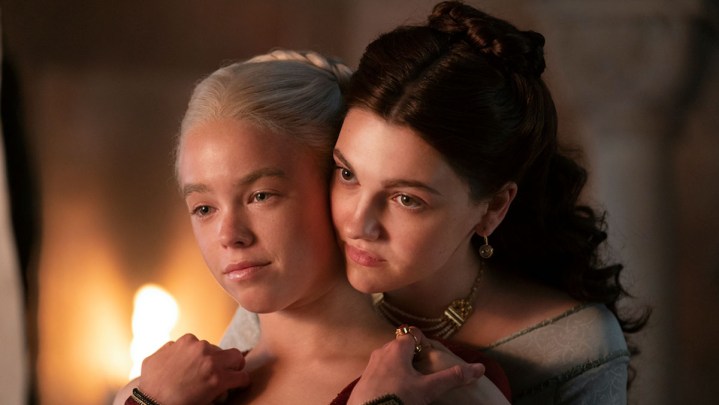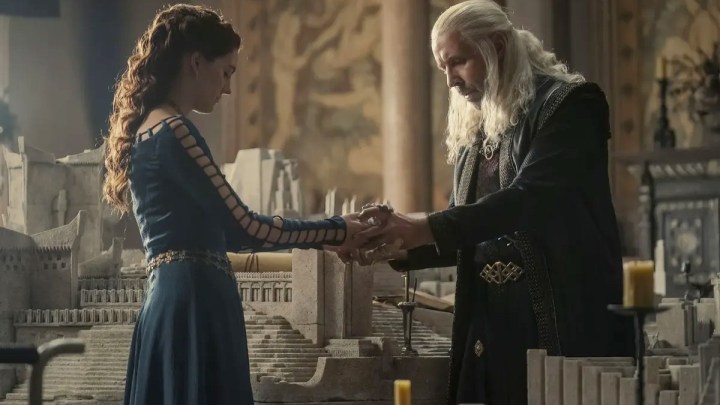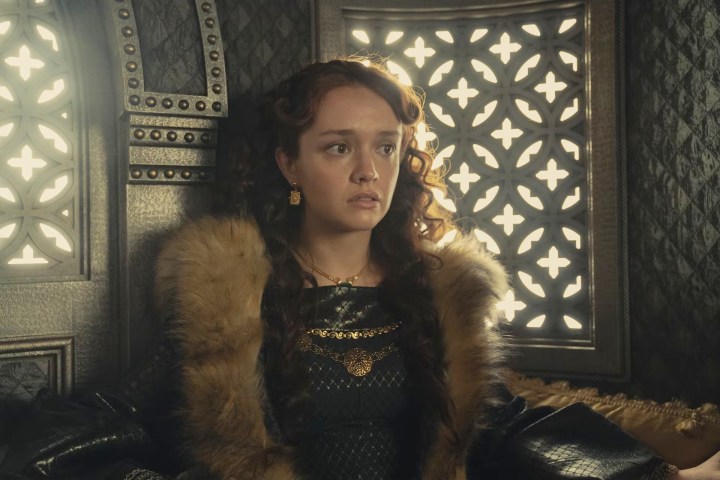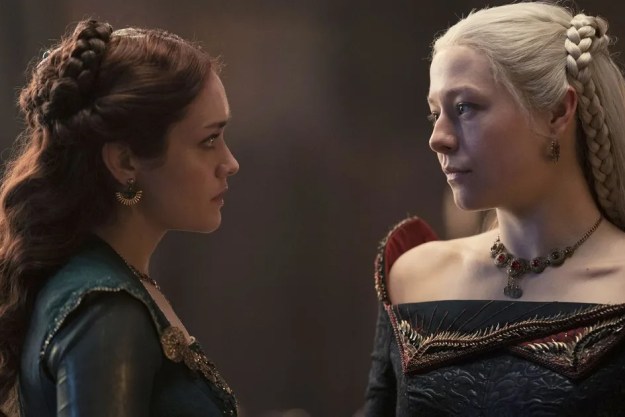House of the Dragon ended its first season with a shocking episode and a tragic death, leading to a full-blown war. The long-promised conflict between the greens and the blacks is finally here, even if fans must wait two years before season 2 arrives. Still, the show will probably stay on people’s minds, especially after Sunday’s explosive finale, and HBO will surely want to strike while the iron is hot. And while season 2 won’t arrive earlier than 2024, the showrunners will likely make it worth the wait.
While we cool down after a season that spanned 20+ years and featured multiple deaths, two weddings, surprisingly few sex scenes, and a whole lot of dragons, we must look back and ponder where our allegiances should lie. All signs point that the showrunners want us, the audience, to side with #TeamBlack; indeed, most of the blacks have been softened, even Daemon, and their cause has been presented as just and fair. The show never shied away from showing Rhaenyra as the true heir, to the point they even had the white stag present itself to her in episode 3. Most of Rhaenyra’s dubious qualities in Fire & Blood have been either dismissed or lessened for the show, thus turning her from a flawed and questionable figure to a prototypical and easy-to-root for heroine we can all rally behind.
It’s easy to understand the reasoning behind these choices. If House of the Dragon wants to present itself as a story of female power crushed under patriarchal oppression, it must have a sympathetic and compelling figure to represent the cause. However, the black-and-white-ization of the Dance of the Dragons means the greens must inevitably become the wrong side to the blacks’ right. Fire & Blood walks a fine line with its characters, but it never takes sides; indeed, the narrative claims the greens and the blacks are equally bad for Westeros. The tragedy of the Dance is that the realm will lose, no matter who sits on the Iron Throne.
However, with the greens acting as the de-facto villains of the show, fans are encouraged to condemn them instantly. House of the Dragon makes this easier by turning Aegon into a rapist, changing Aemond from a decisive leader to a glorified bully, and making Criston Cole the poster child for incels worldwide. Still, the Hightowers remain mostly untouched by the change, mainly because Otto is as one-dimensional a villain as one-dimensional villains come — thank god for Rhys Ifans injecting some panache into the performance. But Alicent is another case entirely. Played by the underrated and internet-breaking sensation Olivia Cooke, Alicent is arguably the most conflicted and complex character in House of the Dragon, and it’s time we start acknowledging just how good of a player in the game of thrones she is.
The Queen in Chains

Alicent’s life is full of half-truths and unfulfilled wishes. Both the book and the show portray her as having a sweet disposition as a child. In Fire & Blood, she spends most of her early life tending to and caring for the ailing King Jaehaerys I, the Wise, who often confused her for his daughter, Saera. Alicent is with him when he dies and remains at court when Viserys I ascends the Iron Throne. The notorious Mushroom claims the source of Otto and Daemon Targaryen’s rivalry stems from Daemon taking Alicent’s virginity. Rumors about her were not uncommon, with many claiming she slept with Viserys while Queen Aemma was still alive. Mushroom went as far as claiming Alicent had also been more than a caretaker for Jaehaerys.
Although the show centers on Rhaenyra’s struggles growing up, it doesn’t extend the same courtesy to Alicent. But Alicent knows more about being at the mercy of men than Rhaenyra herself. After all, Rhaenyra is protected by the Targaryen name, her dragon, and her status as the heir apparent.

Meanwhile, Alicent must live up to her role as the ultimate devotee to the Targaryens, acting as a caretaker for Viserys, a confidant to Rhaenyra, and a wife to Viserys. Her struggles are meaningless in the grand scheme of things; even as Queen of the Seven Kingdoms, she is little more than a way for Viserys to produce an heir. Alicent doesn’t have the luxuries that come with the Targaryen name. Is it so shocking she would grow resenting the carefree Rhaenyra?
What’s worse, Alicent’s devotion to the Targaryens is for naught. Jaehaerys didn’t even recognize her, constantly confusing her for Saera. House of the Dragon has Viserys calling her Aemma, disregarding her years of loyalty and reaffirming her as the second-best option. Alicent spends her life looking after two men who don’t care enough about her to remember her name. Her father only wants to place his blood on the Iron Throne, and the people surrounding her use her as fuel for their cruel gossip constantly.
Rhaenyra is the worst

On the other hand, Rhaenyra is free to come and go as she pleases, messes around with her uncle, and sustains a decades-long affair with her sworn shield that results in three bastard children. Sure, Rhaenyra is still oppressed — this is Westeros, after all, but it’s disingenuous to say she doesn’t enjoy more freedom than many others, men or women, in the realm. With a weak-willed father like Viserys and a pleasant personality that earned her the title of “the Realm’s Delight,” Rhaenyra has everything to get away with hers time and again.
Sure, you can say Alicent had no obligation to the Targaryens, and you’d be right. However, few, if any, women would’ve passed the chance to become Queen of the Seven Kingdoms; a woman only has enough chances in Westeros. You can also say Alicent should’ve supported Rhaenyra’s careless behavior because it might’ve resulted in a shift in the realm’s power dynamics. However, shaming Alicent for doing her duty to the realm and celebrating Rhaenyra for doing the opposite is a weird angle for House of the Dragon to take.
Alicent and Rhaenyra’s climactic confrontation in episode 7, “Driftmark,” summarizes the root of their conflict. Alicent rightly calls out Rhaenyra for her mistakes, which brought unnecessary complications to the lives of everyone — indeed, Rhaenyra spends nearly every episode after the time jump defending her children from bastardy accusations. In turn, Rhaenyra calls Alicent a hypocrite, claiming she hides “behind the cloak of (her) own righteousness,” but it isn’t self-righteousness to own up to your role in the game of thrones. Alicent did nothing but fulfill her duty, and while it’s not Rhaenyra’s fault that Alicent never dared to defy Westerosi conventions, it isn’t Alcient’s fault that Rhaenyra’s indiscretions are a constant problem for house Targaryen.
When you play the game of thrones…

Cersei Lannister’s iconic words ring truer than ever: “When you play the game of thrones, you win or you die. There is no middle ground.” Alicent is now playing the game, and she’s doing it brilliantly. Unlike her impulsive and reckless children, Alicent doesn’t take war for granted. She knows what a civil war will mean for the realm, especially if dragons are involved, and chooses diplomacy over confrontation.
Some may say that she’s a traitor by denying Rhaenyra her rightful claim, but that’s missing the point of the show. She is playing the game, and she’s in it to win it. Her son has a legitimate claim as well, and in Westeros, that’s enough to move the masses. Fans must always remember the kind of show they are watching. The Seven Kingdoms aren’t a place where “fair is fair” and the “right” side prevails. Westeros is a realm where men die for silly little offenses, where weddings aren’t weddings without at least one death, and where violence is the order of the day. If you want something in Westeros, you must take it; if you want to keep it, you must defend it. Wanting correctness from House of the Dragon is like expecting subtlety from a Ryan Murphy production — useless and ridiculous.

Then there’s the Daemon Targaryen-sized elephant in the room. House of the Dragon does a lot to soften Daemon’s sharper edges, and his fans seem intent on portraying him as some kind of misunderstood Byronic hero, even after he mocks his nephew’s death, kills his first wife, and assaults the third one. However, anyone who thinks Daemon would’ve done nothing against Aegon and the Hightowers after Rhaenyra assumed the Iron Throne is fooling themselves. His sole desire has always been the Iron Throne. Daemon would’ve left nothing to chance to secure Rhaenyra’s claim, and Aegon and Aemond would’ve always been a danger to her claim.
Thus, Alicent had two choices: swear further loyalty to a family that did nothing but disregard and disrespect her, taking her for granted for years, or place her blood on the Iron Throne and take control of her life. Judge her if you must, but don’t hate her for playing the game. Alicent grew around it, understanding it better than most. She was given a losing hand from the get-go — a selfish father who used her as a tool, a weak husband chronically afraid of conflict, a station that promised more power than it provided — and knew she had to take matters into her hands.
Time and again, Alicent faces awful choices that question her integrity and sanity, yet she always does what she considers best for the House of the Dragon. She knows her son doesn’t want the Iron Throne but believes the alternative will surely mean her and her family’s deaths. And considering everything she gave to the Targaryens, who can blame her for refusing to also give them her life?
The green queen

For all her flaws — and she has many — Alicent is House of the Dragon‘s best character. She is resourceful but careful; ruthless when necessary, but not without empathy; traditional but unafraid of change and challenge. If it weren’t for the slight fanatism she harbors toward the Faith of the Seven, I would argue she is the best choice to sit on the Iron Throne. And while I don’t blame the fandom for disliking her, I do believe many refuse to see the complexities in her character’s core. Alicent is not evil for the sake of it; she’s not evil at all.
At its core, House of the Dragon is a story about female rage, and that’s what Alicent is: a woman enraged. She has been silenced, humiliated, used, and taken for granted, but not anymore. Is she a traitor? I guess, yes. Is she wrong for wanting to place her son on the Iron Throne? No. Alicent must look after her own. Every mother in Westeros does what she thinks is best for the sake of her children, and Alicent is no different.
Only time will tell how House of the Dragon will continue Alicent’s storyline. I don’t trust the writers entirely, but I do trust Olivia Cooke ever since Bates Motel. However, I hope season 2 will not deprive Alicent of the agency she got in episode 9 or the layers that prevent her from becoming as one-dimensional as her father. If the show wants her to be a villain, so be it; let her choose violence and join Cersei in the pantheon of great Westerosi baddies. However, if they opt to keep her somewhere in between, I sincerely hope they provide enough insights into her mind and purpose.
We are at the dawn of the television antiheroine. God knows Rhaenyra won’t live up to the title — the show seems content portraying her as heroic as they come — so Alicent must fill that role. Yes, Alys Rivers is coming, but we can’t be sure if she’ll be in season 2 or not. Thus, it all falls on Alicent, as always. It’s okay; she can handle it — she’s handled worse. But if she’ll take one for the team, the least we can do is appreciate her for it. It’s time we stop hating Alicent Hightower, especially because no one, and I do mean no one, is playing the game like her. And isn’t that why we watch this show? Anti-heroes and dragons?
Editors' Recommendations
- HBO drops 2 dueling trailers for House of the Dragon season 2
- All the new series heading to Max, including Penguin and Harry Potter
- How House of the Dragon saved Game of Thrones’ tarnished legacy
- The 10 most powerful Game of Thrones characters ever, ranked
- What we’d like to see in House of the Dragon season 2




